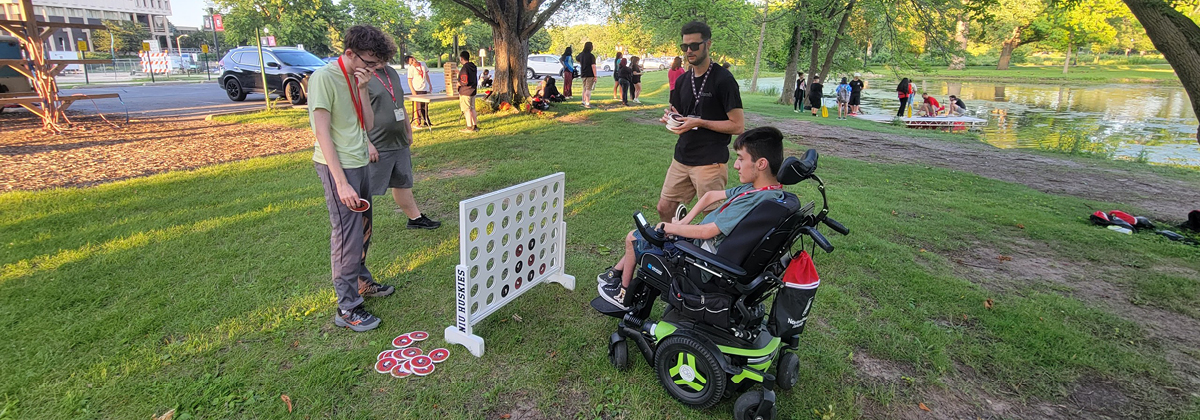- Outreach, Engagement and Regional Development
- Engagement Toolkit
- Engagement Toolkit for the Community

Engagement Toolkit for the Community
Community Engagement Defined
NIU defines community engagement as:
"Community engagement is an intentional collaboration between partners who unite their expertise and resources in a shared vision for the public good. Community engagement is nurtured in a spirit of mutual benefit, reciprocity and shared leadership. It enriches scholarship, research, and artistry. It enhances teaching and learning, addresses critical societal issues and strengthens democratic values. Community engagement takes place here at home and within our global community."
This means that NIU works with external partners on projects to solve problems together. All partners contribute from start to finish and all partners benefit from the work done together. Each side brings its own viewpoint and expertise, which when combined, strengthens the collaboration.
Who is Our Community?
- DeKalb County (we call this area hyper-local to NIU)
- The northern Illinois region that NIU serves
- The state of Illinois
- Other U.S. states
- Other countries
- Businesses
- Non-profit organizations
- Colleges or universities
- School districts
- Local governments
- Groups of people who share a common interest or goal
- Citizens
Why is community engagement important to you?
- Your voice is heard and your expertise is valued on projects.
- NIU may be able to provide resources that your organization needs.
- Partnering with the university on research or teaching projects helps bring a unique prospective to problem solving.
- You can connect with people of all ages who share a common goal.
What does a community-engaged partnership look like?
- Reciprocity: There is a mutual exchange of opinions, ideas and expertise.
- Mutual Voice: Both the community and university have equal say in the planning, execution and follow up of a project.
- Shared Goals: The partnership works toward fulfilling the goals of both the community and the university, even if those goals aren't exactly the same. Both sides are aware from the beginning of each other's project goals and both are of equal value.
- Agreed Plan of Action/Approach: All parties meet early and often to plan their project together. Work doesn't start until the plan is agreed upon. Both parties collaborate on a Memorandum of Understanding (MOU) or Partnership Agreement.
- Shared Effort: All groups contribute to the project work. Contributions may differ based on the skills and expertise of each group, but at the end, the work should be shared equally.
When discussing a community-engaged project with your university partner, you'll want to talk through each of these items:
- Project timeline
- Resources (time, people and money)
- Deliverables
- Modes and frequency of communication
- Expectations of students
- Context of partnership
- Project
- Research
- Service
- Internship
- Ongoing or one-time
Have an initial conversation with your staff or faculty partner.
- Discuss:
- Needs
- Capacity
- Timeline, including holidays and vacation schedules
- Capabilities
- Outline goals and expectations
- Identify resource needs
- Transportation
- Equipment
- Training
- Any other needs specific to your project
- Determine responsibilities
- Scheduling
- Activity/research/project planning
- Data collection and analysis
- Feedback to students
- Broader Impacts The societal impact of a project. This term is often used with community-engaged research projects.
- Civic Engagement Activities or programs that improve a community, usually addressing wider social issues. This term is frequently used with programs related to government or voter registration.
- MOU (Memorandum of Understanding) Also known as a partnership agreement. A document defining the terms that all partners agree to in advance of starting a partnership. All partners should contribute to the creation of the MOU.
- Outreach Programs or projects that benefit and/or interact with the community but doesn't require a reciprocal partnership
- Service Learning Coursework that includes a component where students interact with a real-world project, applying what they are learning in their classroom.
- Stakeholder Anyone who is impacted by a community engaged project. This could be faculty, staff, students, community members, funders, program participants or other people connected to the project in any way.
NIU Resources
Examples of Community Partnerships
Examples of Engaged Partnerships
Find an NIU Partner for Your Project
Other NIU Engagement Opportunities
Community engagement happens across our university. Other departments and programs on campus partner with the community, but if you don't see what you're looking for, email us and we can make connections that align with your project.
- Engagement Toolkits
Partnership Support
If you are currently a partner or are interested in partnering with NIU on a community engaged project or program, and have a question, contact Jennifer Groce, Director of Community-Engaged Partnerships, at 815-753-0916 or jgroce@niu.edu.